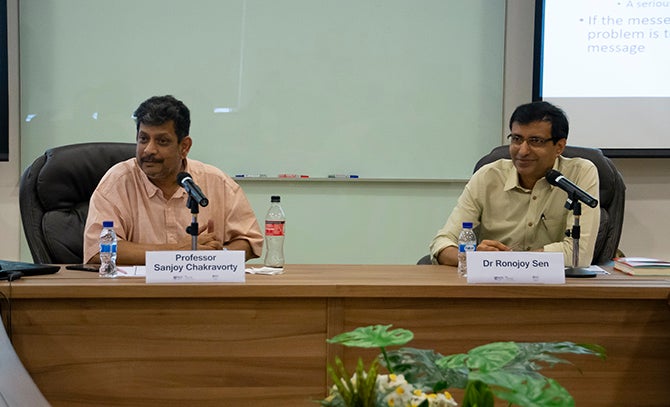
| Event Title: | The Truths of India: Information and Society from Manu to Modi |
| Topic: | ISAS-SASP Seminar |
| Date/Time: | 27 September 2018 | 15:00 - 16:45 |
| Venue: | ISAS Board Room, Level 9, Block B, 29 Heng Mui Keng Terrace, Singapore 119620 |
| Speaker/s: | Professor Sanjoy Chakravorty |
| Speaker Biography/s: | Sanjoy Chakravorty is Professor of Geography and Urban Studies at Temple University and Visiting Fellow at the Center for the Advanced Study of India, University of Pennsylvania. His current research focuses on theoretical and empirical work on India, inequality, cities, land and epistemology. He also writes fiction. His recent books include The Other One Percent: Indians in America (2016, a collaborative work on the Indian diaspora), The Promoter (2015, a novel) and The Price of Land: Acquisition, Conflict, Consequence (2013). His research has been supported by the National Science Foundation, the National Institute of Justice, the American Institute of Indian Studies, and the World Bank. His forthcoming books include The Truth About Us: Information and Society from Manu to Modi, and two coedited collections on land and Delhi. |
| Description: | Professor Sanjoy Chakravorty, Professor of Geography and Urban Studies, Temple University, and Visiting Fellow, Centre for the Advanced Study of India, University of Pennsylvania, USA and ISAS Academic Visitor presented a seminar on the topic of ‘The Truths of India: Information and Society from Manu to Modi’. The session was moderated by Dr Ronojoy Sen, Senior Research Fellow and Research Lead (Politics and Governance), ISAS. Dr Ronojoy began the proceeding by introducing Professor Chakravorty to the audience. The audience included ISAS staff members and members of the public. Professor Chakravorty began by speaking about the concept of ‘truth’. He then put forth two ‘existential questions’ for India which are about the identity of the Indian collective and the trajectory of justice. Professor Chakravorty further laid out two primary arguments. The first is that there is a need to understand the ‘politics of truth’ which involved the variables of power over information and the available information technology. The second argument is that complex information must be reduced to its simplest form to provide cognitive unity. The second argument has certain corollaries as follows:
The more complex the information, the greater the need for simple information; The more the quantity of information, the greater the need for simple information; The greater the number of sources, the less relevant thy all are. Professor Chakravorty then expounded on simplification in the age of ‘scrolls’. He explained that in India, the colonizers created Hinduism by aggregating non-Muslims and creating a common law for Hindus. As such, in a sense, there was no history of India before the British came and gave one. The next section of the seminar focused on ‘simplification’ in the age of smartphones, which, according to European/American literature, can take 3 paths as follows, Populism, Communication building and Accelerated pluralism. Professor Chakravorty then brought together his theses and suggested that there were two paths in India: Democratization, which would have positives such as demise of colonial land laws and negatives such translocal organization by hate groups. The second path being the increasing relevance of simple information which involves aspects such as branding, polarizations and the emphasis on the messenger him/herself being the message. The presentation was followed by an interactive session with the audience. Points of discussion included whether ‘simple information’ is a new concept, the meaning and categorization of information itself, the institutionalisation of information, the new age media, and the caste system in India. |
| Youtube: | https://youtu.be/ERU2EBgxBj4 |


